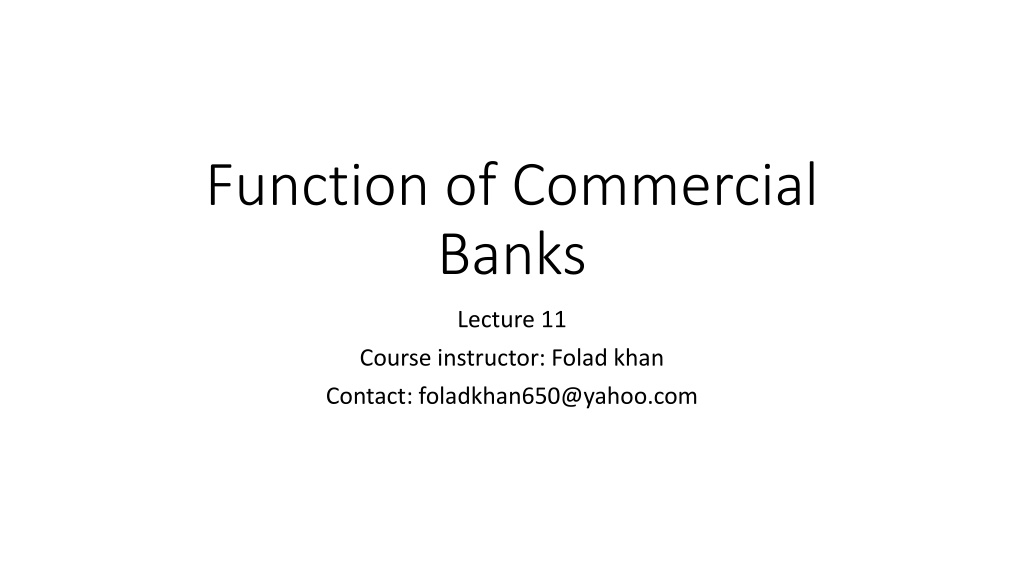Understanding the Role of Commercial Banks in Financial Systems
Commercial banks play a vital role in the financial system by accepting deposits and providing loans to individuals, firms, and companies. They offer various types of accounts like current, savings, and fixed deposit accounts, each with specific features. In addition, commercial banks make loans to different entities, which helps in facilitating economic activities and supporting growth. Cash credits and overdrafts are common forms of borrowing provided by commercial banks. Overall, commercial banks are important institutions that contribute to the functioning of the economy.
Download Presentation

Please find below an Image/Link to download the presentation.
The content on the website is provided AS IS for your information and personal use only. It may not be sold, licensed, or shared on other websites without obtaining consent from the author. Download presentation by click this link. If you encounter any issues during the download, it is possible that the publisher has removed the file from their server.
E N D
Presentation Transcript
Function of Commercial Banks Lecture 11 Course instructor: Folad khan Contact: foladkhan650@yahoo.com
What is a commercial Bank? A bank is a financial institution that deal with money and credit. Commercial banks accepts deposits from individuals, firms, and companies at lower rate of interest and lend at higher rate of interest to those who need them. The difference between two rates is profit of commercial bank According to Crowther, a bank is a firm which collects money from those who have it spare, it lends money to those who require it Mr. Parking, a bank is a firm that take deposits from households and firms and make loan to other households and firms .
Function of a commercial bank A commercial bank perform two types of functions 1. basic function 2. Secondary function 1. Basic Function A. Accepting Deposits: The first important function of a bank is to accept deposits from those who cannot make profitable use of them. To take deposits bank have three types f account Current Account: Holder of this account can withdraw at any time Therefore do not pay interest on deposits Current account holder receive cheque book to be use for withdrawal
Function of a commercial bank Saving Account: Restrictions are imposed on withdrawal Therefore bank pays a small percentage of interest on deposits This type of account are opened by small income group Fixed Deposit Account: Deposits are kept with bank for specified period of time Rate of interest is high The longer the period of time the higher the rate of interest rate
Function of a commercial bank B. Making Loan The second major function of commercial banks is to make loans to businessman, trader, exporter, households, etc. Lending is also known as advancing which comprises a very large portion of banks total assets. The strengths of a bank is judged by the soundness of its advances The lending of money may be in following forms 1. Loans: The commercial banks grant short and long term loans to individuals, firms, and companies mostly against securities
Function of a commercial bank 2. Cash Credit: It is most common form of borrowing by business. The bank advance long term loans to the commercial and industrial units against security of goods. The borrower is permitted to withdraw within the cash credit limit sentenced by bank. 3. Overdraft: An overdraft facility is a credit agreement made with a bank that allows an account holder to use or withdraw more money than what they have in their account up to the approved limit. It is different from cash credit because this facility is used for short term loans. Interest is charged on daily basis on balance account
Function of a commercial bank 4. Discounting of Bills: Discounting of bills refers to making payment of bill before its maturity The discount charged is earning of the bank This is considered safe form of lending in banking transactions
Function of a commercial bank 2. Secondary Functions The secondary function of banks is classified as Special Financial Service and Agency Function Special Financial Service: The business of today is highly competitive, It is not enough to accept deposit and make loan Banks are now offering international services such as Letter of credit Banker acceptance Currency exchange ATM EFT
Function of a commercial bank Agency Function Banks acts agents of their customers in various ways 1. Collection of Cheques: It acts as agent to its customers in the collection and payment of cheques, promissory notes, and bill 2. Collection of Dividends: The bank provides a very useful service in the collection of dividends or interest earned on shares held by customers 3. Purchase or sell of Securities: the bank, if authorized by the customers, purchase or sell securities on his behalf
Function of a commercial bank 4. Execution of standing instruction: The customer may order in writing to his bank to make payment on regular basis to individual or firm by debiting them to his account 5. Acting as Trustee or Executor: Acts as trustee between two parties in the time of transaction, like one cannot lend directly to corporation Execute transactions between corporation and shareholders in the time of IPO























